India Auto Inc scrambles to skill its workforce
Even as the auto industry faces multiple challenges in an era of technological disruptions, there is a bigger threat — as many as 41.5 million positions could remain unfilled by skilled employees between 2019-2025.
More skills per person could be the new mantra for India Auto Inc. The auto industry is not only battling an unprecedented and prolonged slowdown but is also faced with the challenging task of bridging the yawning — 41.5 million positions between 2019-2025 — skilled worker gap. This, even as vehicle manufacturers and component suppliers doggedly take to robotics and automation to enhance quality, reduce workload and ensure a 24x7 output.

A skilled worker is a precious asset and the absence of skills the very opposite. So, when it comes to ensuring that the 19-million workforce employed by the Indian auto industry, which contributes 7.1 percent to the country’s GDP and over 22 percent to the manufacturing GDP, have the requisite skills to power their companies and the industry through a phase of disruption, continuous training, skilling and reskilling them in an age of connectivity, Big Data and automation is absolutely imperative.
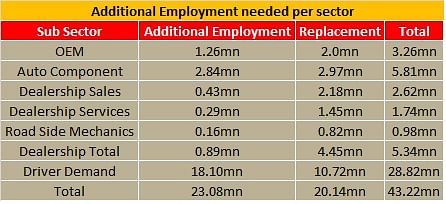
India Auto Inc is currently faced with a Hobson's choice. The existing workforce does not possess the skills that will be required with the arrival of new industrial trends. The industry's only chance is to turn to robots / automation or reskill the existing workforce along with strengthening of skilling institutes for a supply of future-ready manpower.
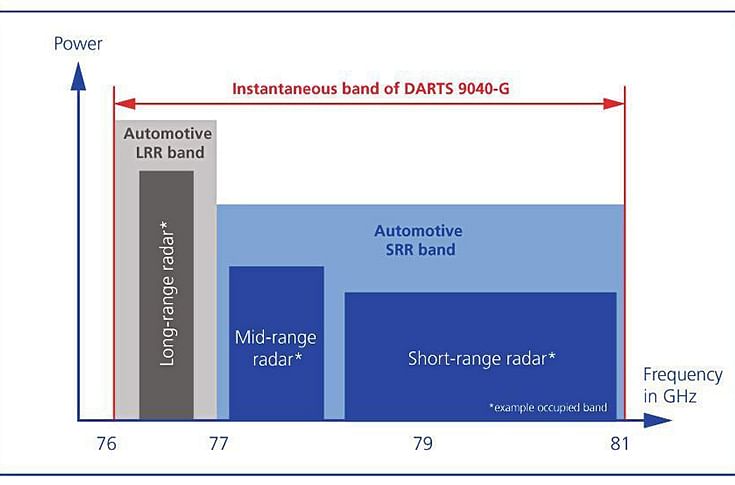
In today's world of smart manufacturing, artificial intelligence, connected technologies and even customised operations, the entire automotive supply chain, from OEMs to suppliers to dealers will be required to upgrade their skill set to align it with new disruptive forces. Industry is today witnesing the emergence of new business models, intelligent technology and a future of work and collaborative education. There is also job polarisation with decline in the mid-level, repetitive and rule-based jobs and increase in demand for creative, design-oriented, high-order skills.
The digital and automation disruption is leading to a scenario where automotive industry employers will face the challenge of finding employable youth in the next five years or so. The most significant imbalances in the labour market, such as unemployment and underemployment, are increasingly linked to the growing mismatch between the demand for and supply of workers with specific capabilities. Therefore, there is an immediate requirement to skill/upskill the workforce.
A draft report on the skill gap, by E&Y and commissioned by the Automotive Skills Development Council (ASDC ), depicts a grim picture for Indian industry.
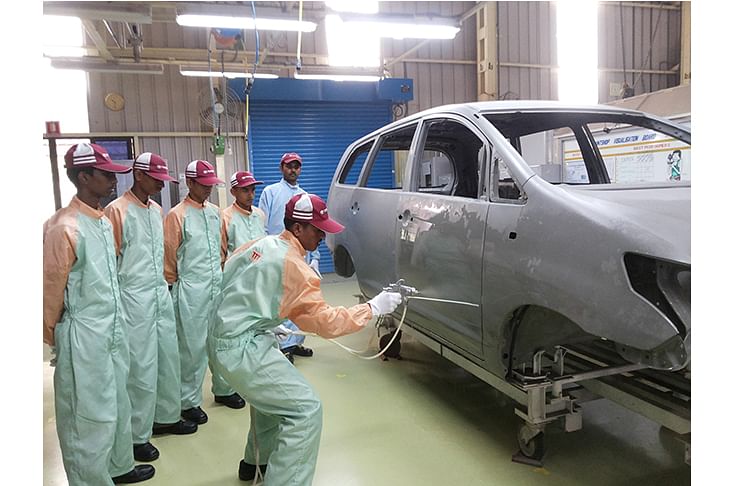
New jobs such as an automobile analytics engineer, 3D printing technician and sustainability integration expert will be among the in-demand profiles in an age of Industry 4.0. While this transition is inevitable and is in line with India Auto Inc's aim to improve quality, efficiency as well as productivity, progress will only be made by constant skilling of the current crop of human resource at companies, and ensuring they are future-ready.
India is set to become the youngest nation on the planet with an average age of 29 years compared to China’s 37 but the humongous skill gap and also the quality of skills is worrying. Nevertheless, along with apex bodies SIAM and ACMA, some dynamic OEMs and suppliers are doing their bit to nurture a new generation of skilled youth. Here's looking at some of them.
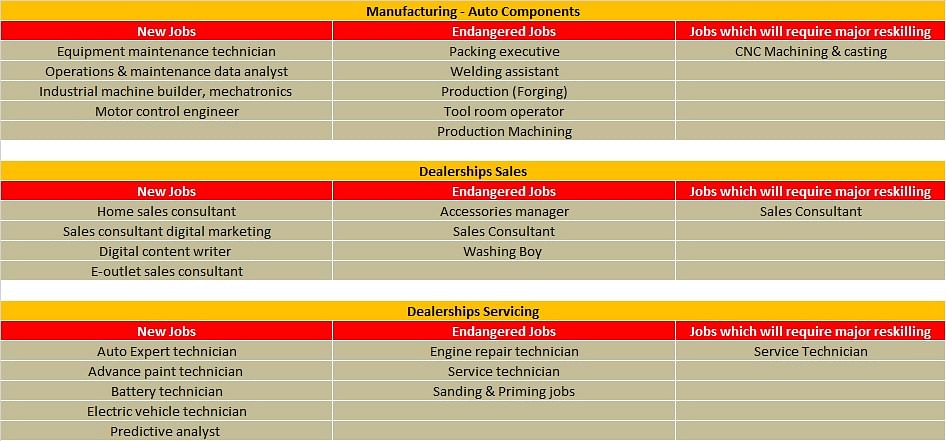
Maruti Suzuki accelerates its people skilling factory
India’s passenger vehicle market leader Maruti Suzuki began its skill development programme back in 2005. From offering trade-wise support to adopting ITIs and setting up the Japan-India Institute for Manufacturing (JIM) in Gujarat and Haryana, the company has come a long way. Its skill development activities can be categorised into three formats:
Upgradation of government ITIs: This involves supporting and upgrading government-run ITIs across India to improve the quality of training and make students industry-ready under the public-private-partnership scheme. The framework consists of five pillars — students learning and progression, staff training and development, infrastructure and learning resources, industry connect, and governance. Maruti Suzuki supports 43 ITIs in 14 states, covering over 25,000 students and 1,500 government instructors.
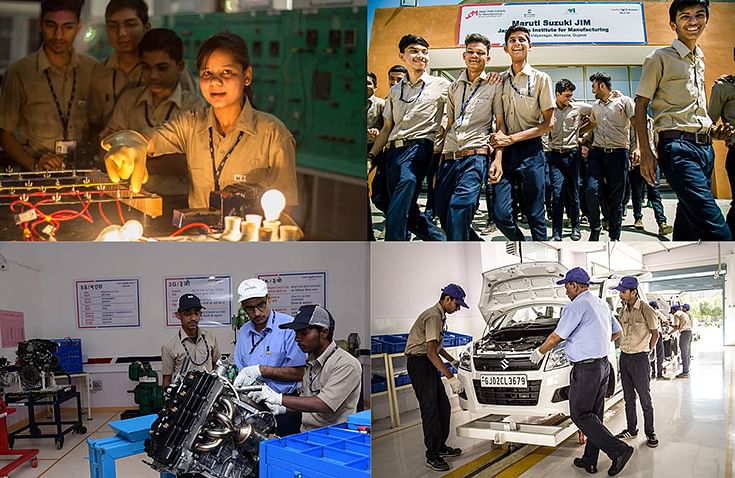
Enhancing trade skills: To bridge the gap between the training imparted at ITIs and the skills required for gainful employment, the OEM has set up over 80 automobile skill enhancement centres (ASECs) at select government-run ITIs. These workshops render practical training to students by Maruti-provided full-time trainers on auto body repair, and painting.
Japan India Institute for Manufacturing (JIM): The first JIM was launched in 2017-18. Born out of a pact between the governments of Japan and India to create a pool of 30,000 skilled people for manufacturing in India over the next decade, the JIM was set up at the AS Patel (Private) ITI in Ganpat University at Mehsana, Gujarat. It offers courses in eight skills including fitter, electrician, welder, mechanic (diesel, motor vehicle, auto body repair, painting) and driver-cum-mechanic.
Some unique features are the mini vehicle assembly line, safety lab, virtual welding simulators and spot welding guns, which facilitate hands-on learning for students. The JIM also offers training in Japanese shopfloor practices, soft skills (kaizen, 5S and 3G), interview skills, English language and safety, all of which help make the graduating students much sought after among employers.
Maruti Suzuki says the first two batches of students graduating from JIM in Mehsana have seen 100 percent placement, with most being absorbed by Maruti dealers in the region, Suzuki Motor Corp’s suppliers in the vicinity of the plant, and also being directly employed on the shopfloor of its latest manufacturing hub.
A second JIM has come up in Uncha Majra district in Gurgaon, Haryana, to cater to the Manesar and Gurgaon industrial belts in NCR. Like JIM Mehsana, it offers eight trades for students with a total intake capacity of 516 students.
Toyota walks the skill talk
Toyota with its renowned TPS (Toyota Production System) and Japanese kaizen (continuous improvement) is renowned for nurturing people skills. So it comes as no surprise that in India, the carmaker, through Toyota Kirloskar Motor (TKM), has taken it upon itself to sustainably build a new generation of skilled personnel each year.
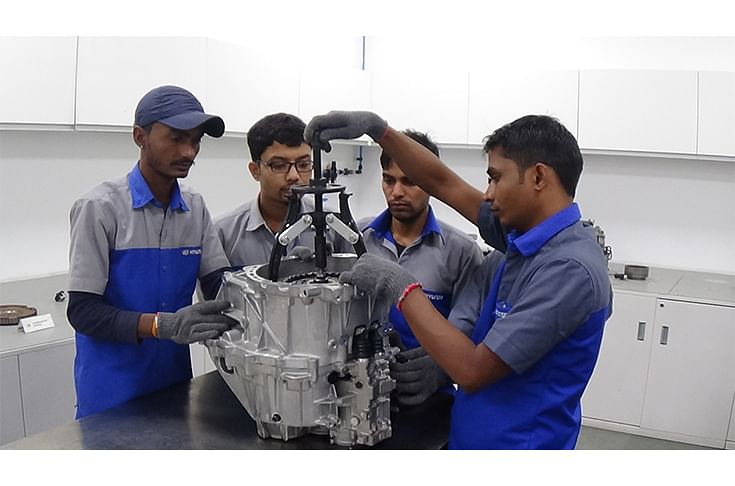
In 2007, the company set up the Toyota Technical Training Institute, which is accredited by the Japan India Institute for Manufacturing (JIM), within its plant at Bidadi, near Bangalore. TTTI, which imparts training to rural students hailing from underprivileged families from across Karnataka, covers the cost of 64 students every year (expanded to 120 from this year onwards).
In its three-year course, TTI's training curriculum focuses on holistic development of knowledge (16%), skill (34%), and body and mind (50%). The aim is to develop good corporate citizens equipped with Toyota-specific methodologies and create learning opportunities for deserving individuals.
The students also get an opportunity to participate in the National Skill and the World Skill Competitions (Skill Olympics) in three categories — Mechatronics, Car Painting, and Prototype Modelling.
Over the past 12 years, TKM has trained 573 students at TTTI and imparted relevant skills to another 8,000 under the Toyota Technical Education Program (T-TEP) conducted in partnership with 49 ITI / diploma institutes across 17 states in the country.
T-TEP imparts training in general repair, automotive body and paint repair, helping develop a highly-skilled technical workforce with bright career opportunities.
Additionally, Toyota is making its dealers capable in providing short-term, skill-oriented training programmes utilising 13 dealer centralised training centres [DCTCs] across India. This has, so far, helped over 2,000 students across the country, according to the company.
As part of its new employee induction programme, Toyota’s Gurukul (Skill Development Centre) set up within its premises, offers three levels of training — Fundamental Skill, Element Work and Standardised Work Training. This micro-level training, the company says, helps the employees develop skills to manufacture world-class cars. And, to develop a skilling culture among its workforce, the Gurukul organises Skill Olympics at the organisational level.
TKM has secured an overall second position in terms of skill performance within APAC among all Toyota affiliates in the region. That’s not all. TKM has set up eight Toyota Centres of Excellence (TCoEs) at different engineering colleges in Karnataka that help enhance the skill sets and offer well-trained, qualified workforce to the automotive industry.
This initiative, the company says, is incorporated to pursue its main objectives to promote, set up, monitor, govern and regulate institutions and academies for skill excellence through development of core employability skills, competency standards and to train on advanced technologies to meet the industry demands globally.
Hyundai Motor India shines on the people front
Hyundai Motor India is making dynamic moves on the skilling front. It has set up 24 skilling centres — 8 regional training centres (RTCs) and 16 training academies — to train employees and impart different skill sets. It has also tied up with 54 institutes — ITIs and polytechnics — for enhancing worker skills.
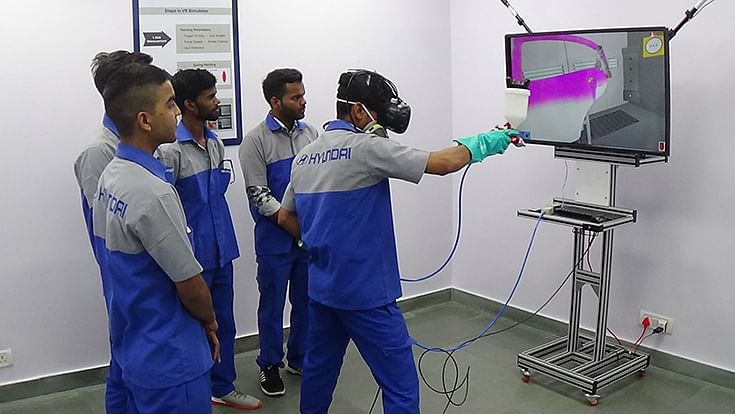
At its own training centres, the company offers training in various technical courses (E-module, basic, expert, advanced, on-job training); non-technical courses for drivers, service advisors, customer relations teams (more than 2,000 women staffers have been trained so far), and managers; body and paint courses for body and paint shop teams, and various need-based trainings.
Hyundai says with the shifting dynamics of the auto industry, courses on connected vehicle technology, new model training, workshop automation as well as electric vehicle training are the ones seeing robust demand. The company has also brought in some industry-first initiatives such as VR simulation-based training for paint technicians; an online learning management system for training sales representatives across its dealer partners and enabling continuous learning and re-learning by use of the digital platform. Hyundai says that the application sees 87 percent of its dealer sales staffers registered with the platform for routine assessments.
In October 2019, Hyundai Motor India saw its dealer technicians winning laurels at the Hyundai World Skill Olympics, held in Seoul. Recently, the company conducted its National Skill Championship at its training facility in Faridabad. The competition saw 3,000 service advisors and 577 customer relations managers participating from over 1,300 service centres across India.
According to S Punnaivanam, vice-president and national service head of Hyundai Motor India, “Hyundai’s annual National Skill Championship is aimed at honouring, encouraging and elevating the most deserved personnel in the Hyundai service family. The skill enhancement programme endeavours to upgrade the skills of service advisors and customer care managers to enhance proficiency and make them future-ready and meet customer expectations.”
In FY2019, over 23,000 dealer staffers received training and 625 students were imbibed into the Hyundai ecosystem after getting trained. Overall, 6,500 and 6,000 students were placed across its service network in FY2018 and FY2019, respectively. During the recruitment of dealer manpower, aptitude/ psychometric assessments are conducted, while a pre- and post-assessment is done for all certification courses. Periodical ‘refresher’ courses are also offered to assess long-serving dealer staffers. The company also conducts bi-annual training sessions for in-house dealer trainers and trains them on soft-skills as well as on the latest technology, apart from the new model trainings. Hyundai Motor India’s trainers are also routinely imparted training in advance technology by training and psychology experts at Korea.
Nissan Motor India's expansive engagement with its workforce
For Nissan Motor India, which has a sprawling manufacturing facility in Chennai, skilling has been a continuous process to ensure qualitative products not just for India but for a host of countries Nissan exports to from India. Nissan exports the ‘made-in-India’ Sunny to the Gulf region and Datsun models to South Africa.
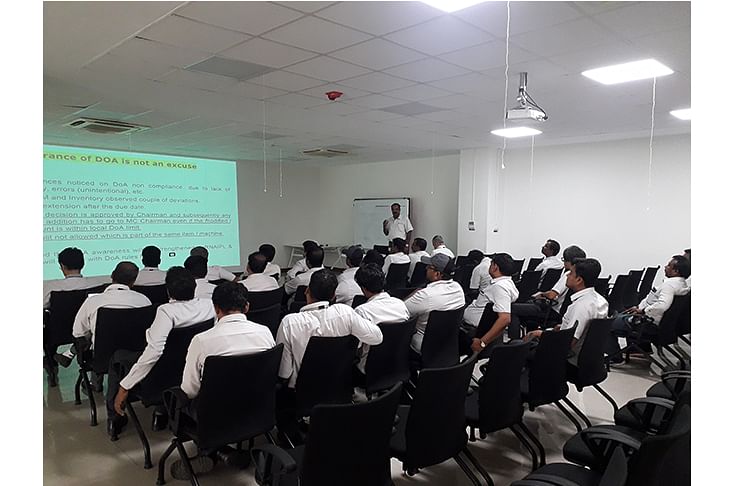
As part of its India strategy to make its workforce ready for future technologies, Renault-Nissan Alliance India (RNAIPL) has signed MoUs with the National Skill Development Corporation (NSDC) and institutions such as Hindustan Institute of Engineering and Technology (HIET) and
TVS Training and Services in Chennai to help it develop training modules in the latest competencies and skills for its employees.
RNAIPL provides support through onsite labs, training, mentorship, internship and / or participation of experts in specific domains. It also mobilises and advocates upskilling and reskilling through dual Technical Vocational Education and Training (TVET). Employees get access to seminars and workshops on industry relevant technologies.
At HIET and TVS Training and Services, it offers courses around maintenance skills, mechatronics and basic job skills. On design skills, it is collaborating with the Renault-Nissan Technology Business Centre India (RNTBCI) to ensure that its engineers are ready for new projects. The trained workforce can be deployed in India-specific as well as on global projects that need specialised and experienced talent. Currently more than 20 operators are supporting global plants.
“A team of skilled workers is the most valued asset for any company. It is the efficiency of this team that helps in achieving the plant KPIs. RNAIPL training modules are designed to enhance skills of the shopfloor team and help them identify areas of improvements to be more efficient. It reinforces the kaizen mindset and promotes implementation of low-cost automation to reduce cost and add value to productivity. In addition to these benefits, regular training also keeps the motivation levels high and helps to create a pool of skilled workforce,” says Biju Balendran, MD and CEO, RNAIPL.
“Adoption of technology always brings higher efficiencies, cost optimisation and better utilisation of available resources. Industry 4.0 is all about artificial intelligence, connected cars and electric vehicles. At RNAIPL, we are adopting new technologies, robots and going in for 3D printing among other things. Glimpses of these are already available in our cars on the roads even today. The 3D printed parts are generally used during the R&D phase and get evaluated along with our supplier partners. Progressing to the next phase of technology is part of natural growth of the industry and it will fuel growth of the sector overall,” he adds.
Kia Motors India bets big on training
Kia, which is currently clocking robust sales of its Seltos SUV in India, remains fully focussed on achieving high-quality production, high levels of service and sales satisfaction to ensure it expands its footprint in India. As a result, the focus on training is intense; the company operates three training centres located in Anantapur around its manufacturing unit. While the KMI Training Centre, Penukonda (Anantapur) is self-operated by the company, the Basic Training Course Centre, Anantapur and the APSSDC, Centre of Excellence, JNTU, Anantapur are both run in collaboration with the Andhra Pradesh government.
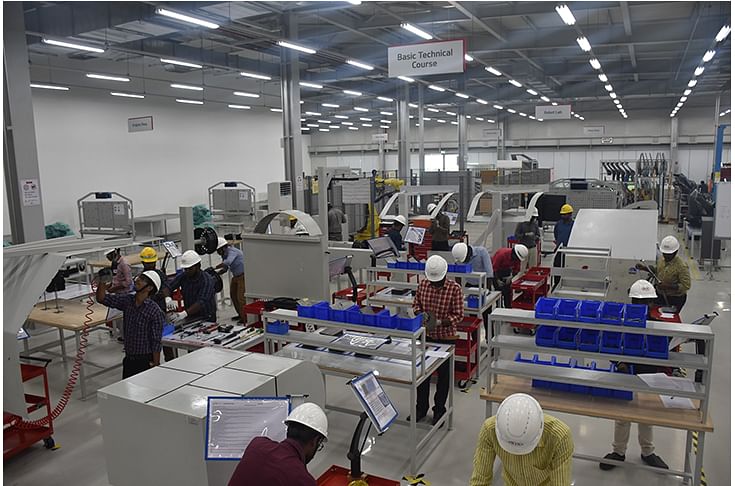
The company offers two major courses — Basic Technical Course for Automobile Industry, which gives a detailed training of the basic shopfloor jobs in an automotive manufacturing facility, and spray and touch-up training for automobiles, offering specialisation to perform jobs required in paint shop of a manufacturing unit.
These training courses have reflected a fairly good placement record with over 61 percent of the candidates from the two training centres getting placed in KMI’s own manufacturing facility in Anantapur. Till now, the company has appointed 1,217 candidates as trainees at its plant and has trained almost 2,000 students until December 2019.
Honda, Yamaha up the ante in skilling people
Honda Motorcycle & Scooter India's (HMSI) multi-dimensional plan involves several initiatives to train and develop skills of its manpower deployed at various levels.
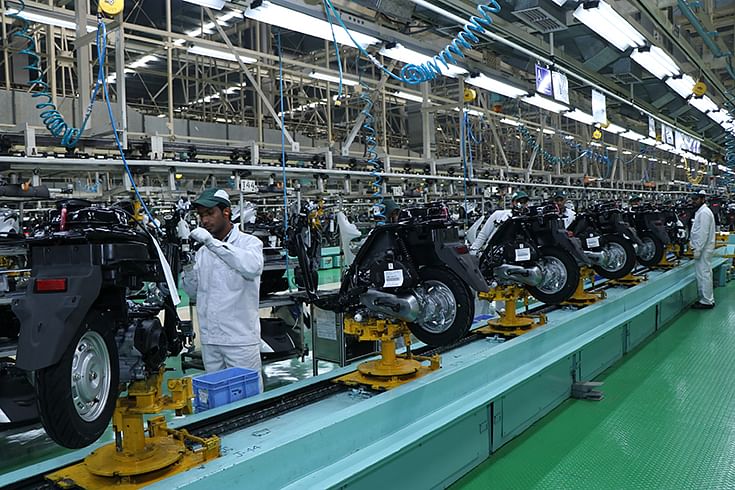
HMSI has set up skill enhancement centres across India and also runs a wholly-owned ITI under the PPP model in Petlad, Gujarat, near its fourth manufacturing unit. It is also operating 35 skill enhancement centres — 27 at government ITIs and 8 in collaboration with the NSDC — across 16 states.
These centres are equipped with a fully functional workshop and service infrastructure with two motorcycle lifts, two Honda vehicles (one scooter and one motorcycle) for training, measuring tools and other essential equipment to enable practical training on technical aspects of two-wheeler maintenance and repair. Since the opening of the first centre in October 2018, HMSI has benefitted over 2,000 students. On completion of training programme, HMSI supports successful candidates with recruitment opportunities at Honda dealerships. It has thus far conducted 16 job fairs recruiting 400 candidates across India.
To keep its business partners up-to-date with the continuously changing environment, Honda organises multiple trainings at regular intervals. Its LEAP (Learn Engage Act Perform) programme is designed for the rapid improvement of Sales Area In-Charges by achieving an understanding of the correct interpersonal and management methods. It is meant to help them in strategising the sales as per the ongoing market dynamics. The course also explains the ways to improve customer experience and works on their soft-skills as well.
Designed especially for zonal-level managers within sales, the HLP (Honda Leadership Program) aligns these managers with the thought process of management, thus resulting in achieving the mutual goals. Honda’s NEST (Next-gen Entrepreneur Skill-up Training) is designed specifically for the upcoming generation of entrepreneurs, who are willing to join their family and assist them in running their existing Honda two-wheeler dealerships.
According to Pradeep Pandey, senior vice- president, Customer Service, HMSI, “The automobile industry in India has been through several ups and downs recently. With multiple norms and rules coming in place, we at Honda take it as our duty to set new practices in effect to upgrade and upskill with the changing times. Realising the need of the hour, we have chalked out a plan to support our existing as well as the potential workforce.”
India Yamaha Motor currently operates 42 centres of the Yamaha Training School (YTS) in India, while the curriculum, pedagogy, examination and evaluation are controlled by the Yamaha Training Academy (YTA), situated inside its first manufacturing facility in Surajpur, Greater Noida.
The company offers Automotive Service Technician – Two-wheeler course in the YTSs. A total of 1,698 students including 1,643 men and 55 women have received training from YTSs so far. In 2018, 358 out of 480 total candidates across 38 centres in India received jobs through placement activities.
On December 3, the company conducted its 10th national-level Grand Prix for technicians and spare parts managers. The event drew 2,522 contestants under the ‘technician’ category; 1,289 under ‘service advisor’; and 499 participants under the ‘spare parts’ category, from the company’s service stations from across India.
The contestants are tested on the grounds of troubleshooting, ability to use Yamaha Diagnostic Tool Version 3.0 (YDT V3.0), repair, final inspection, engine noise check, vehicle receiving and delivery on actual two-wheelers with speed, accuracy and quality. The winning technician of NTGP will get a chance to participate in the Yamaha World Technicians Grand Prix in Japan next year. YTA is the company’s main education programme which is established worldwide in order to develop a professional league of technicians.
Freudenberg celebrates 10 years of skilling
With over 80 percent of a vehicle’s components being provided by part suppliers, Freudenberg, which set up a Training Centre in Nagapattinam in Tamil Nadu in 2009, is celebrating 10 years of skilling Indian youth. The facility was established with a vision to provide career and skills-oriented vocational training to young people. Thus far, over 700 young people have received professional training to start off their careers as welders, fitters, machinists, mechanic (motor vehicle) and electricians.
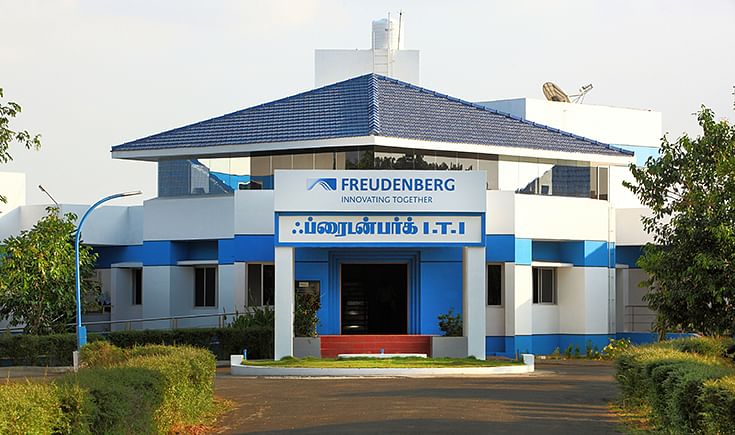
The Training Centre has top quality equipment and facilities and has been approved by the NCVT. According to the company, the training is special because young people receive both theoretical and practical lessons in line with the German dual vocational education system for a period of one or two years depending on the course. Ninety percent of the trainees find work right after completing their courses. Most have found jobs in well-known organisations, mainly automotive, in the Chennai area and other cities.
“Skill development is essential as part of the drive to build on India's socio-economic infrastructure. Bridging the critical gap between manpower availability and employability is important to provide sustainable livelihood opportunities," said Georg Graf, Regional Representative, Freudenberg Regional Corporate Centre, India and Trustee Freudenberg Training Centre, Nagapattinam.
Schaeffler Tech Training Centre makes a difference
Schaeffler India has completed the first year of operations of its Technical Training Centre in Navi Mumbai. The facility at its Navi Mumbai office premises is an initiative undertaken to provide hands-on training to mechanics to ensure best-in-class services to end customers. Through this centre, Schaeffler’s automotive aftermarket division has been showcasing its expertise as a system specialist and has implemented training competencies for transmission, engine and chassis components.
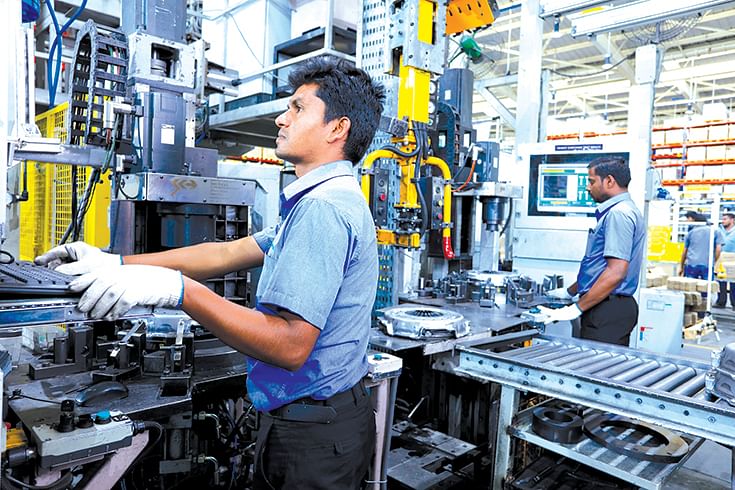
According to Debasish Satpathy, vice-president (Automotive Aftermarket), Schaeffler India, “As vehicle technologies become more complex, we continue to see the skill gap widen within the larger, independent garage workers when it comes to repairs and maintenance. Consumers want faster and hassle-free resolution and that can only happen with skill upgradation. To address this aspect, we have introduced the Technical Training Centre for garages in our Navi Mumbai office. The centre is one of a kind and has been developed with an aim to expand our technical expertise to the personnel working at garages.”
Maruti Suzuki reaches out to its suppliers
With component manufacturers playing an extremely crucial role in giving shape to the final vehicle, Maruti Suzuki believes that it is imperative for its vendors to imbibe quality manufacturing practices. It has introduced a unique model christened ‘Dojo centres’ at its vendors. A Dojo centre serves as a workshop that helps in skilling, acclimatising and thoroughly preparing workers, especially new workforce before they join manufacturing plants.
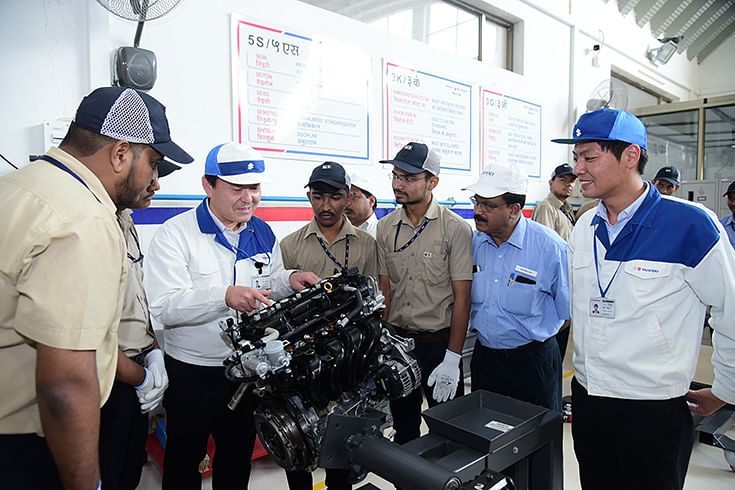
In a Dojo centre, a worker is trained again and again in a task, systematically using models or mock-ups till he or she perfects it. Experienced trainers help the new operators gain confidence and correct them each time. An effort to replicate exact working conditions as inside a shopfloor is also made, so that the worker feels at ease when he joins work after his training. Ideally, a new worker is trained for 9-10 days before he joins the shopfloor.
An assessment test is also conducted at the end of the training, and only qualified workers are sent to the shopfloor. Reskilling of existing workforce is also undertaken to refresh manufacturing concepts and educate them about new technological advancements. The Dojo centre also provides theory lessons in basic concepts of manufacturing apart from a brief overview of the company. Knowledge about the company helps the worker stay connected with the company.
The main thrust of such training remains on on-job training sessions with a safety culture being inculcated among students right from the very beginning. The training gives exposure to four key pillars of quality, safety, productivity and training and Maruti Suzuki with its Tier-I suppliers is investing in building skill pool through dedicated Dojo centres.
The company has helped set up one of the first Dojo centres inside the premises of its supplier partner Uno Minda in 2016. Ever since then, this centre has been setting examples for its Tier 2 suppliers and also Tier 1 suppliers. Maruti Suzuki has set a target of helping 400 of its vendor partners set up Dojo centres at their premises by 2020.
Henkel teaches 'em differently
For Henkel Technologies India, an example of its self-driven training initiative for industry players is the Flexible Packaging Academy in Mumbai, which provides training based on the principle of 'Learning by Doing'. The training program combines essential theoretical knowledge and hands-on practical training. Henkel says the state-of-the-art academy provides Indian Institute of Packaging-certified training on lamination technology to entrepreneurs, production managers, supervisors, operators, quality control personnel and other professionals.
Henkel also collaborates with partners to ensure skills are imparted to the workforce across industries in which it operates. One such example is the Vehicle Repair and Maintenance centres created by Henkel Adhesive Technologies India in collaboration with Kohinoor Technical Institute (KTI). These centres are focused on enhancing the skill sets of not just the students but also mechanics working in workshops, as many of them do not possess formal training. Currently four such KTI centres are operational, all in Maharashtra.
The course being offered at the KTI centres is an Adhesive Application course, which is part of diploma programme approved by the NSDC. The course consists of 30 percent theory and 70 percent practical work; this ensures that students who complete the course are well equipped to undertake any type of repairs or maintenance. This course is geared to help these mechanics to be qualified and be gainfully employed. So far, says company, over 1,000 students have undergone this training, and all have found gainful employment.
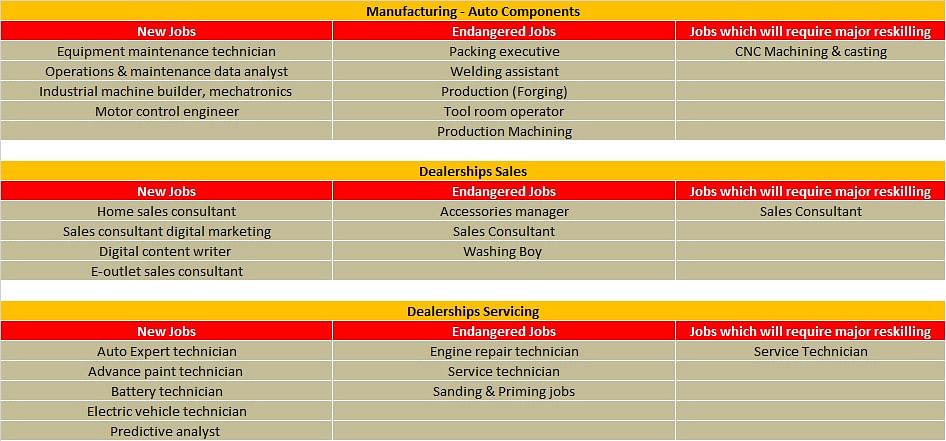
As the auto industry negotiates its way through to the future, a skilled workforce will always be the foundation of a successful company. So, when it comes to finding out how's the josh, the answer will always be in an upskilled, future-ready workforce.
RELATED ARTICLES
RSB Group Prepares for Hyper-Growth: New Markets, Tech and Mission ₹10,000 Cr
From a small workshop in Jamshedpur to an engineering group with global reach, RSB Transmissions is preparing for its mo...
Beyond Helmets: NeoKavach Wants to Make Rider Airbags India’s Next Safety Habit
As premium motorcycles proliferate and riding culture evolves, an Indo-French venture is betting that wearable airbags, ...
Inside Mahindra Last Mile Mobility’s Rs 500 Crore Modular Platform Strategy
Mahindra Last Mile Mobility has launched the UDO, an electric three-wheeler built on a new Rs 500-crore modular platform...






 18 Jan 2020
18 Jan 2020
 26433 Views
26433 Views





 Darshan Nakhwa
Darshan Nakhwa



 Shahkar Abidi
Shahkar Abidi

